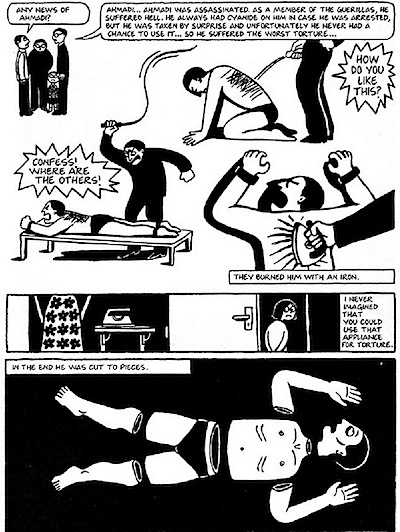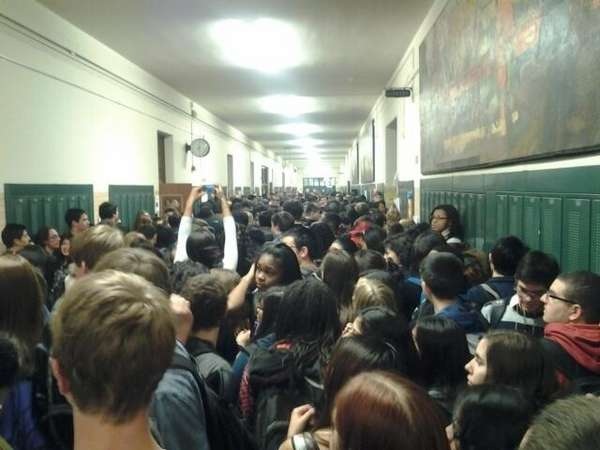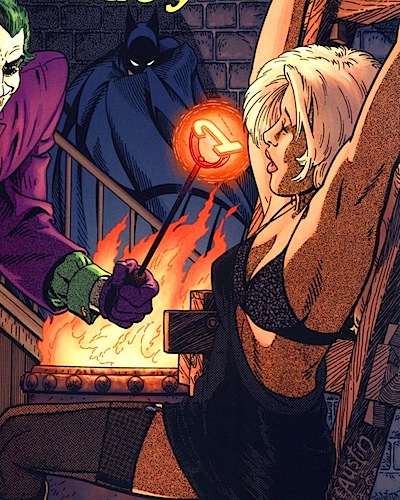September 22-28, 2013 is Banned Book Week. In honor of that week, I will be blogging about banned or challenged books this month.
Perhaps more than any other genre with the possible exception of literary fiction (and that's an iffy comparison), Science Fiction, and its cousin Fantasy, is about ideas. Ideas can be controversial, and often bring out the would-be censors.
Worlds Without End has a Web page that lists 47 frequently challenged or banned Science Fiction and Fantasy books. What do you think of the books on their list? I'll bet that, if you are a SF/F reader, some of your favorites are on their list. How would your life be different if these books had been kept from you by well-meaning parents or community activists?
- The Amulet of Samarkand, Jonathon Stroud
- Animal Farm, George Orwell
- Brave New World, Aldous Huxley
- Carrie, Stephen King
- Cat's Cradle, Kurt Vonnegut, Jr.
- A Clockwork Orange, Anthony Burgess
- Cujo, Stephen King
- The Day After Tomorrow, Robert A. Heinlein
- The Dead Zone, Stephen King
- Fahrenheit 451, Ray Bradbury
- Flowers for Algernon, Daniel Keyes
- Frankenstein, Mary Shelley
- The Giver, Lois Lowry
- Grendel, John Gardner
- Gulliver's Travels, Jonathan Swift
- The Handmaid's Tale, Margaret Atwood
- Harry Potter and the Sorcerer's Stone, J.K. Rowling
- Beloved, Toni Morrison
- The Hitchhiker's Guide to the Galaxy, Douglas Adams
- Interview with the Vampire, Anne Rice
- Lord of the Flies, William Golding
- The Lord of the Rings, J.R.R. Tolkien
- The Hobbit, J.R.R. Tolkien
- The Martian Chronicles, Ray Bradbury
- The Master and Margarita, Mikhail Bulgakov
- Naked Lunch, William S. Burroughs
- Nineteen Eighty-Four, George Orwell
- Roadside Picnic, Arkady Strugatsky and Boris Strugatsky
- The Satanic Verses, Salman Rushdie
- Shade's Children, Garth Nix
- Slaughterhouse Five, Kurt Vonnegut, Jr.
- Stranger in a Strange Land, Robert A. Heinlein
- We, Yevgeny Zamyatin
- Welcome to the Monkey House, Kurt Vonnegut, Jr.
- The Iron Dream, Norman Spinrad
- The Golden Compass, Philip Pullman
- The Subtle Knife, Philip Pullman
- The Amber Spyglass, Philip Pullman
- The Lovers, Philip Jose Farmer
- The Hunger Games, Suzanne Collins
- Catching Fire, Suzanne Collins
- Mockingjay, Suzanne Collins
- The Lovely Bones, Alice Sebold
- Tithe, Holly Black
- Valiant, Holly Black
- Ironside, Holly Black
- Ragtime, E. L. Doctorow
As we suspected when the news broke, the removal of Persepolis from the seventh grade curriculum at a Chicago high school turned in to a minor media circus pretty quickly, with school officials saying different things all over the place. If you missed all the confusion, the Chicago Tribune
has the authoritative round up and Claire Kirch covers it for PW. Basically it emerged that the book was not being removed from school libraries or all schools, but it is being removed from the 7-10 grade curriculum where it is is currently being taught. The person who seems to have decided that is at the very top: Chicago Public Schools CEO Barbara Byrd-Bennnet who wrote:
“It was brought to our attention that it contains graphic language and images that are not appropriate for general use in the seventh grade curriculum. If your seventh grade teachers have not yet taught this book, please ask them not to do so and to remove any copies of the book from their classrooms.”
Another spokesperson has more to say at PW:
Even though Persepolis currently is included on Chicago’s common core curriculum for grades 7 and 11, it will not be taught to students in grades 7-10 in the nation’s third largest school district until, CPS office of teaching and learning chief Annette Gurley told PW by phone Friday afternoon, a training guide for teachers wanting to use Persepolis in their classrooms can be drafted by the CPS curriculum department and set in place. Persepolis will continue to be taught in grades 11 and 12 and in Advanced Placement classes.
“We want to make sure that the message about inhumanity [is what] kids walk away with, not the images of someone with exposed body parts urinating on someone’s back or someone’s being tortured,” Gurley said, “We are not protesting the value of this book as a work of art. We just want to make sure that when we put this book into the hands of students, they have the background, the maturity to appreciate the book.”
Just to be clear, here is the torture scene in question:

Author Marjane Satrapi was reached for comment by the Trib, and expressed dismay:
“It’s shameful,” she said. “I cannot believe something like this can happen in the United States of America.”
Regarding the district’s concerns about the depiction of torture, Satrapi said:
“These are not photos of torture. It’s a drawing and it’s one frame. I don’t think American kids of seventh grade have not seen any signs of violence. Seventh graders have brains and they see all kinds of things on cinema and the Internet. It’s a black and white drawing and I’m not showing some
While it’s clear that the ban or removal isn’t as widespread as initially feared, it sparked a statement from the Chicago Teacher’s Union pointing out that “the only place the book is banned is Iran”,
a protest and a read-in at
Social Justice High School.

And this morning, students at Lane Tech High School, where the teaching ban originated, staged a sit in that was broken up by authorities after about 20 minutes.
Lane Tech students organized today’s 8 a.m. sit-in in the school’s library on Facebook and other social media platforms, however faculty broke it up about 20 minutes later, according to student reports on Twitter.
Multiple students reported on Twitter that the library was locked and up to 400 students flooded the surrounding hallways.
One student Tweeted shortly after 8 a.m., “The lack of keys at the library was pre-orchestrated librarians, teachers, staff knew well in advance what we were doing.
This story is still developing, and given the much loved nature of the book we suspect some reversals may still be coming. In the meantime, the best thought piece we’ve seen is
Julian Darius on
just why it may have been the images of torture that upset someone. He also points out that Persepolis was previously challenged in a Washington State school.
In 2009, parents tried to get both the book and movie banned in the Northshore school district. At issue were three specific complaints about content:
language that “would not be acceptable over the open airways via either TV or radio” and that students would be disciplined for using;
a brief sequence depicting torture in Iran, including a man urinating on a torture victim; and
the vague claim that the book is “sexually charged.”
In addition, complaints were made about parents not being notified in advance and that an alternative assignment wasn’t available. The district claimed this wasn’t true, and a curriculum review committee for the district rejected the parents’ complaints.
Also, as Darius point out, it’s also good thing superhero comics aren’t taught in 7th grade.

Every year, I set at least one reading goal to help lead me to the books I'll read that year. Last year, my goal was to read the last two Twain novels I'd never read (that's Mark, not Shania), and to begin rereading all of Steinbeck's novels and selected non-fiction in the order written, to study his development as a writer.
This year, I am continuing my Steinbeck goal, but I've also decided to read at least ten of the most-often-challenged books in the US as listed by the American Library Association. I've also added a few other books to my list that have led to authors being banned or even jailed in other countries.
These are books whose very presence in a library or classroom is challenged by parents, community organizations, school boards, churches, governments, and a host of others who feel that the very presence of a book in one of those pesky storehouses of knowledge and ideas we call libraries threatens the fabric of society, the idea being that books, as well as other art forms, should always be uplifting (according to their definition of "uplifting"). The ALA website has a fascinating list of some of these books and the reasons they have been challenged by specific groups, including some right here in Utah, as well as lists and graphs describing various facts about bans and challenges.
Many of the reasons why a book is challenged are valid from particular perspectives. Parents are, by far, the largest group of challengers. Certainly, parents have a right to raise concerns about assigned reading they consider offensive or inappropriate for readers of a certain age. Whether they have the right to determine what an entire community reads based on their own opinions, well, that's an argument I won't get into here (but just saying that probably reveals my position well enough). This post is not about parental rights.
Many books are challenged or banned for reasons that appear weak to most of us. Banning the Harry Potter books for glorifying witchcraft and magic, banning Twilight because it includes supernatural characters who fall in love with mere mortals, or banning The Lord of the Rings for being satanic all sound kind of silly, but all have happened. Banning The Adventures of Captain Underpants for depicting a boy in his underwear, or banning the entire Goosebumps series for being frightening and having ghosts and other spooky ookies, doesn't sound any better. Many of these bans obviously come from people with extremely narrow views who have never read the books.
But many challenges are much more complicated. For example, the most-often challenged book in the US is often challenged, not because of closed-mindedness but because of an attempt to discourage bigotry and closed-mindedness. I'm talking, of course, about "The Adventures of Huckleberry Finn." True enough, That Word is deeply offensive. Even though it is considered worse today than it was in the story's (and author's) time and place, it was still not a nice word back then. In Twain's time, it was very similar in effect to the currently misused adjective, "gay." Questioning the presence of a book so full of the N-word in a classroom, especially one in which many students are likely to be personally offended, is not completely ununderstandable.
The problem is, to ban the book for depicting racism is to miss the point. Yes, it depicts racism. Huck struggles with racism throughout most of the book, believing that slaves can hardly have feelings like "real people," and questioning whether he's doing the right thing by helping him. For much of the story, Huck ponders turning Jim in. But over the course of their journey, Huck learns that Jim is, in fact, a person, has feelings, loves his family, values freedom, and is not all that different. When Huck finally decides that he'll even risk eternal damnation to help Jim become free, Twain is making one of the most powerful anti-racism statements in American literary history.
In many cases, books like "Huck Finn" are taught in order to mak
A big thanks to Josh Olesker of the National Coalition Against Censorship, who confirmed, on the record, that Revolutionary Voices, a GLBT title, has been removed from Burlington County Public Library in New Jersey because "children may find it."
From Olesker's comment to my prior post on this instance of book banning:
"Greetings All: You have the story correctly. "Revolutionary Voices" has been pulled from not just the Rancocas Valley School library but now also from the Burlington County (NJ) library system. It's not just about the children; simply put, book-banning is now a reality in Burlington County, and everybody ought to know about it. We here at the National Coalition Against Censorship (NCAC) have been following the situation for some weeks now and are glad to hear of your concern.
As the NCAC understands the BCLS part of the story, a female member of the 912 group (possibly Mrs. Marinelli) approached the BC Library staff to complain about "Revolutionary Voices" and push for its removal there too, sometime close to when the book was pulled from the RV school library, since "kids might find it there also." Instead of following the BCLS formal challenge procedure, the staff (under director Gail Sweet and library commissioners including Patrick Delany, whose name appeared on and then disappeared from a local 912 group member list earlier this spring) quietly pulled all available copies of the book off the shelves. Today there are no available copies of "Revolutionary Voices" in the BC library system, but it was pulled quietly in the hope that you wouldn't notice.
It is said that "free people read freely." That is not the case today in Burlington County, NJ. For more information and how you might get involved, visit www.ncac.org.
Joshua Olesker
National Coalition Against Censorship
www.ncac.org"
In a nutshell, then:
the reconsideration process was bypassed;
the book was removed from the adult nonfiction section of the public library;
the reason was "children could find it."
Amazon Affiliate. If you click from here to Amazon and buy something, I receive a percentage of the purchase price.
© Elizabeth Burns of A Chair, A Fireplace & A Tea Cozy
And another book banning situation. This time in my home state of New Jersey.
As always, my initial reaction to book banners is "who died and made you god of what other people cannot read?" It's actually scary to think that people live in such a bubble of belief, that they know best for the entire world, including me and you.
As reported in the Philadelphia Inquirer:
"The day after members of a Burlington County [New Jersey] conservative group successfully petitioned to have a book on teenage homosexuality labeled obscene and removed from a high school library, organizer Gerry Grabinski was ebullient.
The local chapter of talk-radio and television personality Glenn Beck's nationwide conservative watchdog network, Burlington County 9.12, had won a minor political coup Tuesday night, and Grabinski was hopeful its larger message would gather momentum as a result."
The books that will destroy the minds of teenagers:
Revolutionary Voices , edited by Amy Sonnie
, edited by Amy Sonnie
Love & Sex , edited by Michael Cart
, edited by Michael Cart
The Full Spectrum: A New Generation of Writing About Gay, Lesbian, Bisexual, Transgender, Questioning, and Other Identities
All three were challenged; Revolutionary Voices: A Multicultural Queer Youth Anthology is the one that was pulled from school library shelves. And the group is now expanding its focus to other high schools.
It's almost reassuring, that the group is so obvious in its antiGLBTQ focus, as opposed to other groups that pretend its the "damn" in the book rather than the lesbian best friend that is the reason a book is challenged. At least they are upfront: no GLBTQ books. I am also interested that those who may say, "we want less government interfering in our lives" in other circumstances want to interfere in others lives, using the government (here, the school board) to make that happen.
Here's the thing: you don't want your teens reading "those" books? That's between you and your teen. If they go against your wishes and read them anyway? That's a parenting issue, and the solution isn't to make the books go away.
Links:
Over in the UK, the Guardian reports on School ban on gay anthology challenged by US free speech organisations.
2 Comments on We Don't Need Your Stinking Books, last added: 5/15/2010







Before I was a mother I was horrified that anyone would try to censer our society by banning books. And while I still don't believe in the practice I am more empathetic towards parents and teachers trying to protect their children. I have a fourth grader with the reading level of a seventh grader. As a writer my passion is in teen fiction but I worry about the dark, edgy and disturbing tone that haunts most teen fiction sections. It's frightening to think about the roads those dark, disturbing and therefore fascinating themes will take him.
Interesting how many of these I've read without even knowing.
I understand, MeLisa. With six kids, I know how scary it can be to be a parent. You worry about them going against your teachings. You worry about who they'll hang out with, what they'll do, how they'll drive, who they'll date, who they'll marry, how well they'll raise their kids. In the end, I believe, they are better served by a broad view of the world though, and so by exposure to ideas that maybe I don't agree with, some of which they'll undoubtedly pick up and take for their own. But I'm proud of my kids because they have grown into young men and women who think for themselves, and who, by exposure to both the beautiful and the ugly, have learned to tell the difference, and to be able to deal with new ideas, whether they agree or not, because they are not shocked to learn that there are disagreeable ideas in their world.
I'm going to save this list. The ones I've read on it really are some of my favorite books. It makes me want to read the rest of them (besides Stephen King, I don't like being scared or grossed out).